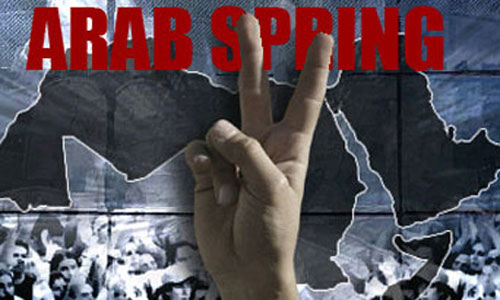Those bemoaning the death of the Arab Spring must read what Hashem Saleh has to say. Unlike the apologists for Arab dictatorships who are reading the Arab revolts from ideological and political perspectives, Saleh is analyzing the Arab Spring from a philosophical perspective, according to Karam al-Helou. Those nostalgic for the reigns of oppressive systems like the one still destroying Syria like to spend their free time coming up with terms like “fall” and “winter” to substitute “Spring.”
The assumption that a “Spring” has blossomed only if there was a total break with the past is rejected by Saleh, a Syrian scholar known for his translations and interpretations of Mohammed Arkoun (1928-2010), the noted Algerian-French scholar of Islamic studies and an influential advocate of Islamic reform. Saleh advances his views of the Arab Spring in his latest book, “Arab Uprisings in Light of the History of Philosophy” (Dar Al Saqi, 2012) and this was the subject of a review by Lebanese writer Karam al-Helou, published in the Beirut-based Nawafez magazine.
Saleh concurs with the claim that the rise of the Muslim Brotherhood and their domination of the state in more than one Arab Spring country does not constitute a break with the past or dictatorship, but he parts company with those analysts who downplay the uprisings in the Arab world and reject their importance. While Saleh refrains from calling the Arab Spring a democratic revolution, he nevertheless acknowledges that it has shaken the stagnant quagmire and exposed the shortcomings of the intellectually rigid and long-calcified political systems. Judged according to this function, the Arab Spring represents a progressive moment in the “general course of the movement of history,” though the “cost will be exorbitant.”
The gloom and doom hypothesis about the Arab Spring is challenged by Saleh whose inspiration is Hegel’s “Philosophy of History,” particularly the Hegelian dialectic. Since the “doom and gloom” chorus is founded on the new authoritarian policies of Islamist Tunisia and Egypt, Saleh finds the political and social hardships caused by these regimes to be expected and even necessary in order to achieve genuine democracy. As Hegel introduced into the discussion, the “negative” manifested by the immense sacrifices of the Egyptian and the Tunisian peoples for the past two years, are a precondition to achieve the “positive,” that is the birth of genuine democracy. It is the Hegelian dialectic; an idea challenged by counter idea, to subsequently produce a new idea.
The suffering under a Brotherhood or Islamist regime will not go in vain for, as Saleh says, paraphrased by al-Helou, at a later stage Islamism or the Muslim Brotherhood will exhaust themselves and lose their credibility, thus losing support and paving the way for a more enlightened society. Here again Saleh draws on the law of the dialectics of history as described by Hegel. According to this law, history is rational and will move in the direction of rationalism, order and freedom.
But Saleh cautions us that the battle will not be determined politically. The intellectual battle needs to be won first. Winning this battle is very difficult for it requires a war against the medieval thinking that dominates a large majority of the Arab peoples. Only when the new interpretation of Islam defeats the old sectarian one will Arab enlightenment return.
The pessimists of the Arab Spring range from ideologues in the Stalinist tradition to Christian religious and secular figures and their supporters who think the revolts will sweep minorities from the Middle East. Without addressing such detractors, Saleh appears to be telling them that what has taken place in Egypt is not an Arab Spring if by this one means democracy. He could be saying that there is no need to rush to attribute all social ills – including the plight of minorities – to the Arab Spring.
The democracy that is being talked about nowadays is “stripped of its essence,” or from its enlightened liberal essence, argues Saleh. To live in a genuine liberal democracy is to establish a modern liberal system which is the necessary background for real democracy. But are we near such a conclusion? Saleh is not optimistic and thus does not believe an enlightened revolution is very near in the Arab world. In fact, Saleh says it is presently moving in the opposite direction. Still, his conclusion is not to dismiss what the Arab Spring could mean for change in the Arab world: it “inaugurated a historical necessity whose creative interactions will not stop before causing radical change in Arab societies.”
Elie Chalala
© Copyright 2013 AL JADID MAGAZINE

